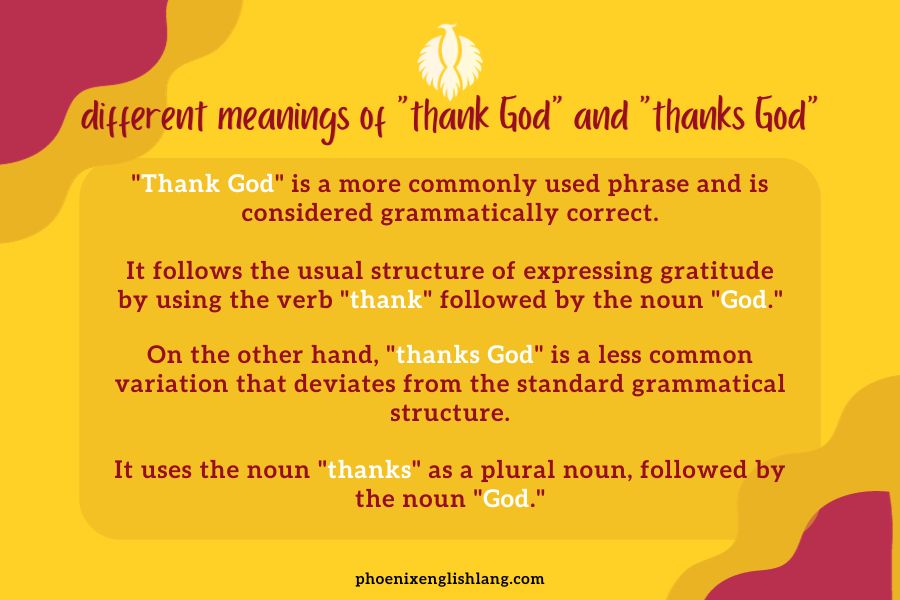Hey there! In this awesome article, we’ll dive into the wonderful phrase “thank God” or “thanks God” and explore its incredible meaning, usage, and cultural significance.
We’ll take a closer look at the different situations where this expression is used and have a delightful discussion about its implications.
Which One Is Right – Thanks God or Thank God ? What’s The Main Answer?
The correct phrase is “Thank God.”
This expression is commonly used to express gratitude or relief towards a higher power.It is a way of acknowledging and appreciating the role of a divine being in a particular situation.
While “Thanks God” may be a common mistake, the correct form is “Thank God.” On top of that, we’ll tackle some common questions that pop up when we think about the title, “thank God or thanks God.
” So, which form is right? Well, believe it or not, both are correct, depending on how you use them.Isn’t that cool? It’s all because of how the verb “to thank” changes to show who’s saying it.
Amazing, right? Religious and spiritual folks often use this phrase to express their appreciation for their higher power.The trick to knowing which form to use is to understand how subjects and verbs work together.
It’s not hard at all, but you’ll want to remember which one is right for proper speaking and writing.Can’t wait to show you more!
Expressing gratitude to a higher power is something lots of cultures do. But sometimes people get confused about whether to say “Thanks God” or “Thank God.”
So, let’s talk about what each phrase means and when to use them.
1.”Thanks God”:

Usage and Meaning
“Thank God” is a common expression used to convey relief, gratitude, or thankfulness. It is often employed when someone is expressing relief that something bad did not happen or gratitude for a positive outcome. The phrase can be used in both religious and secular contexts, making it versatile and widely understood.
Religious Context
In religious contexts, “Thank God” is a direct expression of gratitude towards a deity. It acknowledges the belief that God has played a role in the positive outcome or has provided protection. For example, a person might say, “Thank God for keeping us safe during the storm,” attributing their safety to divine intervention.
Secular Context
In secular contexts, “Thank God” is used more as an idiomatic expression rather than a literal invocation of a deity. It conveys relief or gratitude without necessarily implying religious belief. For instance, someone might say, “Thank God the traffic wasn’t bad today,” simply to express relief about the traffic situation.
Examples of Usage
- Relief: “Thank God I found my keys; I was worried I had lost them.”
- Avoiding Negative Outcomes: “Thank God we didn’t miss the flight.”
Cultural Significance
The phrase “Thank God” is deeply embedded in many cultures and languages. It is a quick and effective way to express strong emotions of relief or gratitude. In some cultures, it is used frequently in everyday conversation, while in others, it might be reserved for more significant occasions.
Psychological Impact
Using expressions like “Thank God” can have a positive psychological impact. It allows individuals to acknowledge and express their emotions, which can be a healthy way to process experiences. Expressing gratitude has been linked to improved mental well-being and happiness.
Variations and Synonyms
There are several variations and synonyms for “Thank God” that can be used depending on the context and personal preference:
- Thank goodness: A more secular alternative that avoids religious connotations.
- Thank heavens: Another secular option that conveys a similar sense of relief.
- Thank you, Lord: A more explicitly religious variation often used in Christian contexts.
Common Misunderstandings
One common misunderstanding is that “Thank God” is only appropriate in religious contexts. However, its widespread use in secular settings demonstrates its versatility. Another misconception is that it should be avoided in formal writing or speech. While it is true that more formal alternatives might be preferred in certain contexts, “Thank God” is generally acceptable in most conversational and informal written contexts.
In short, “Thank God” is a versatile and widely used expression that conveys relief and gratitude. Its usage spans both religious and secular contexts, making it a valuable phrase in everyday language. Whether expressing relief after a stressful situation or gratitude for a positive outcome, “Thank God” effectively communicates strong emotions and helps individuals process their experiences.
2. “Thank God”:

Usage and Meaning
“Thank God” is a common expression used to convey relief, gratitude, or thankfulness. It is often employed when someone is expressing relief that something bad did not happen or gratitude for a positive outcome. The phrase can be used in both religious and secular contexts, making it versatile and widely understood.
Religious Context
In religious contexts, “Thank God” is a direct expression of gratitude towards a deity. It acknowledges the belief that God has played a role in the positive outcome or has provided protection. For example, a person might say, “Thank God for keeping us safe during the storm,” attributing their safety to divine intervention.
Secular Context
In secular contexts, “Thank God” is used more as an idiomatic expression rather than a literal invocation of a deity. It conveys relief or gratitude without necessarily implying religious belief. For instance, someone might say, “Thank God the traffic wasn’t bad today,” simply to express relief about the traffic situation.
Examples of Usage
- Relief: “Thank God I found my keys; I was worried I had lost them.”
- Avoiding Negative Outcomes: “Thank God we didn’t miss the flight.”
Cultural Significance
The phrase “Thank God” is deeply embedded in many cultures and languages. It is a quick and effective way to express strong emotions of relief or gratitude. In some cultures, it is used frequently in everyday conversation, while in others, it might be reserved for more significant occasions.
Psychological Impact
Using expressions like “Thank God” can have a positive psychological impact. It allows individuals to acknowledge and express their emotions, which can be a healthy way to process experiences. Expressing gratitude has been linked to improved mental well-being and happiness.
Variations and Synonyms
There are several variations and synonyms for “Thank God” that can be used depending on the context and personal preference:
- Thank goodness: A more secular alternative that avoids religious connotations.
- Thank heavens: Another secular option that conveys a similar sense of relief.
- Thank you, Lord: A more explicitly religious variation often used in Christian contexts.
Common Misunderstandings
One common misunderstanding is that “Thank God” is only appropriate in religious contexts. However, its widespread use in secular settings demonstrates its versatility. Another misconception is that it should be avoided in formal writing or speech. While it is true that more formal alternatives might be preferred in certain contexts, “Thank God” is generally acceptable in most conversational and informal written contexts.
In short, “Thank God” is a versatile and widely used expression that conveys relief and gratitude. Its usage spans both religious and secular contexts, making it a valuable phrase in everyday language. Whether expressing relief after a stressful situation or gratitude for a positive outcome, “Thank God” effectively communicates strong emotions and helps individuals process their experiences.
You might also enjoy: Boys’ or Boy’s– Which One is Correct? + Example
You can use this phrase in different situations, like:
a.Expressing relief:

When someone barely avoids a dangerous situation or has something good happen, they might say, “Thank God!” Like if there’s almost a car accident, someone might say, “Thank God we’re safe!”
b.Gratitude for good stuff:
People often say “Thank God” to show gratitude for good things or when something positive happens.
For example, someone might say, “Thank God for this promotion; I’ve been working hard for it.”
c.Recognizing divine help:

Sometimes people think a higher power has helped them or played a part in something.In those situations, they might say, “Thank God.”Like if someone says, “Thank God for helping me through this tough time.”
d.Differences in when to use them:
Deciding between “Thanks God” and “Thank God” depends on the situation and how formal you need to be.”Thank God” is the normal and accepted phrase that works in formal and informal situations.
It’s for when you really mean it and want to show gratitude or relief.But “Thanks God” is not the standard way to say it and you should avoid using it in formal writing or professional settings.
However, you could use it in casual conversations or when you’re not so worried about following grammar rules.”Thank God” is the right phrase to show gratitude or relief to a higher power.
Most people use it in lots of different situations.But “Thanks God” is not the usual way to say it and you should avoid it in formal situations.Knowing when to use each phrase will help you communicate better.
Thank God or Thanks God is like a phrase people always say when they’re really thankful or relieved about something good happening.People usually say it when they want to show that they’re grateful for something lucky that happened or when they’re happy about a good result.
You can use this phrase in different situations, like when someone narrowly avoids something dangerous or when they get good news.For example, someone might say “Thank God, I found my lost keys” or “Thanks God, the weather cleared up for our outdoor event.”
It’s worth mentioning that this phrase is usually used in a religious or spiritual way, because it shows gratitude towards a higher power.
You might also enjoy: “Humans” or “Humen”? Which One Is Correct?
Meaning of “Thank God” or “Thanks God”
Thank goodness or thank heavens are such wonderful expressions that bring about a feeling of gratitude or relief towards a higher power.These phrases are often used to show appreciation or thankfulness for a positive outcome, a stroke of luck, or the resolution of a challenging situation.
They suggest that the speaker believes that the positive outcome or relief they are experiencing is due to divine intervention or providence.While the specific meaning may differ based on an individual’s religious or cultural beliefs, the overall sentiment behind these expressions is to acknowledge and give credit to a higher power for the positive result.
It’s worth noting that the usage of these phrases may vary among people, and some may use them as idiomatic expressions without necessarily implying a religious connotation.In such cases, the phrases may simply serve as a way to express relief or gratitude without specifically mentioning a deity or religious belief.
When you want to express gratitude and appreciation, you use the verb “thank.”It is a way to show your thankfulness and demonstrate your appreciation.The rules of conjugation come into play when using the word “thank.”When referring to I/You/We/They, we say “thank God” each and every day.
For a singular individual, whether male or female, we add an -s at the end of “thank.”In all other cases, it is simply “thank” without the -s. When using “Thank God” as an expletive, there is no -s at the end.
It is a way to express relief or acknowledge a blessing from a higher power.Expletives often include an exclamation point, such as “Thank God!” For example, when we thought we would never see the end of the backed-up traffic, we express our gratitude to God.
When you arrived home safely after the horrible blizzard, we thank God.We also express gratitude when we narrowly avoid a car accident.We say “Thank God it didn’t happen!” Furthermore, we express our joy and gratitude when two people are getting married.
We say “Thank God!” In all these examples, “Thank God” does not have an -s at the end of “Thank.”This is because it is a statement directly from the speaker and does not refer to the subject.
It implies “I” when used as an expletive.In Brazil, people often say “Thanks God.”It is important to note that “Thank God” is the correct form when expressing gratitude.
“Thanks God” should only be used when directly speaking to God, such as “Thanks God for keeping my family safe.”
Different meanings of “Thank God” and “Thanks God”

there is a small distinction between the phrases “thank God” and “thanks God.”The main difference lies in their grammar.
“Thank God” is a more commonly used phrase and is considered grammatically correct.It follows the usual structure of expressing gratitude by using the verb “thank” followed by the noun “God.”
On the other hand, “thanks God” is a less common variation that deviates from the standard grammatical structure.It uses the noun “thanks” as a plural noun, followed by the noun “God.”
While “thank God” is widely accepted and understood, “thanks God” may be considered non-standard or even grammatically incorrect by some language enthusiasts.
However, it is worth noting that language is always changing, and variations like “thanks God” may gain acceptance over time through common usage.Ultimately, both phrases convey the same feeling of expressing gratitude or relief towards a higher power.
You might also enjoy: Sensitive Vs Sensible [Video + Examples] 2023
1. What are the cultural and religious implications of using this phrase?
The cultural and religious implications of using the phrase “thank God” or “thanks God” can vary depending on the individual and their beliefs.
In many monotheistic religions, such as Christianity, Islam, and Judaism, people often use these phrases to show their gratitude towards the divine for blessings or positive outcomes.
It shows that they believe in a higher power and appreciate their role in their life.For those who have strong religious beliefs, using these phrases is a way to express their faith and acknowledge that good things happen because of God.
However, it’s important to remember that not everyone who uses these phrases necessarily has religious beliefs.Sometimes, people use these phrases as a way to express relief, gratitude, or a sense of good luck.
It’s crucial to respect and understand the diverse cultural and religious perspectives when considering the implications of using these phrases.
2. Can This Phrase be Used In Non-religious Contexts?
While the phrase has strong religious undertones, it is not exclusively limited to religious contexts.In secular settings, individuals may use this saying as a figure of speech or as a cultural norm without necessarily attributing the result to a higher power.
It can be seen as a way to express relief or gratitude in a more general sense, regardless of religious beliefs.Expressing Gratitude and Relief: The Importance of Saying “Thank God” in Different Situations Expressing gratitude and relief is a common human reaction to positive outcomes or moments of relief.
One saying that is frequently used in such situations is “thank God.”This saying holds importance for many individuals, especially those who have religious beliefs.
Saying “thank God” is a way of acknowledging a higher power or divine intervention that is believed to have played a role in the positive outcome.It is a way of attributing the success or relief to a force beyond one’s control.
In religious contexts, saying “thank God” is deeply rooted in faith and serves as a way to express gratitude towards the divine.It is seen as a way of acknowledging the blessings and guidance provided by a higher power.
For believers, it is a way of recognizing that their prayers have been answered or that they have been protected from harm.It can also be seen as an expression of trust and reliance on a higher power in times of difficulty or uncertainty.
However, it is important to note that not everyone who uses the saying “thank God” necessarily holds religious beliefs.In some cases, it may be used as a figure of speech or a cultural expression without a literal religious meaning.
It can be seen as a way of expressing relief or gratitude in a more general sense, without explicitly invoking a specific deity.In these instances, the saying may be used to convey a sense of relief or appreciation for a positive outcome, regardless of one’s religious beliefs.
3. Are There any Alternatives to Using “Thank God” or “Thanks God”?
These alternative phrases offer individuals the opportunity to convey their appreciation or sense of relief without directly referencing a specific deity.These alternative phrases give individuals the means to convey their appreciation or sense of relief without directly mentioning a particular deity.
we can express gratitude to God in one sentence by saying “Thank God for all the blessings in my life.”Some commonly used alternatives include “thank goodness,” “thank heavens, Thank goodness for that! Thank the universe! Or simply, thank you.
These phrases are frequently employed to express gratitude or relief without any religious connections.Additionally, individuals may choose to express similar sentiments by saying “I’m grateful,” “I’m relieved,” or “I’m thankful.”
It’s important to remember that the choice of alternative phrases may vary depending on personal preference, cultural background, and the specific situation.
Ultimately, the aim is to express gratitude or relief in a way that is respectful and inclusive to everyone involved in the conversation.
You might also enjoy: Have Vs Had: Complete Grammatical Guide [2023 Method]
Who say “Thank God” and “Thanks God”

Both America and England are primarily English-speaking countries, and as such, the phrases “thank God” and “thanks God” are commonly used in both regions.However, it’s worth noting that cultural and religious differences may influence how often and in what situations these phrases are used.
In America, a country known for its religious diversity, the phrase “thank God” or “thanks God” is often used to express gratitude or relief.These expressions are commonly used in everyday conversations, whether they are casual or formal.
While America has a strong tradition of religious freedom, it’s important to recognize that not everyone may share the same religious beliefs.Therefore, it is advised to use these phrases with sensitivity and respect for others’ perspectives.
Similarly, in England, where Christianity has historically played a significant role, the phrases “thank God” and “thanks God” are also commonly used.These expressions are often used to convey gratitude or relief in various situations.
However, just like in America, it’s important to be mindful of cultural and religious diversity when using these phrases, as not everyone may share the same beliefs or may prefer alternative expressions of gratitude or relief.
In both countries, individuals may also choose to use alternative phrases such as “thank goodness,” “thank heavens,” or simply “thank you” to express similar sentiments without specifically referring to religion.
Ultimately, the choice of phrase may vary depending on personal preference, cultural background, and the specific context in which they are used.It’s always important to be respectful and considerate of others’ beliefs and preferences when engaging in conversations.
The Varied Usage: Cultural, Religious, and Personal Factors
The usage of phrases like “thank God” or “thanks God” can vary from person to person and culture to culture.
It’s hard to give an exact number of how many people use these phrases, but it’s safe to say that they are commonly used expressions in many parts of the world.
These phrases are often used to show gratitude or relief in everyday conversations.
However, it’s important to note that the frequency of their use may vary depending on factors like religious beliefs, cultural norms, and personal preferences.
In places where religious beliefs have a strong influence, such as countries with a strong religious presence, these phrases may be used more frequently.
On the other hand, in more diverse or secular societies, people may choose to use different expressions to convey similar feelings without referring to a specific religion.
It’s worth mentioning that language is always changing and evolving, and the use of phrases can change over time.
As society becomes more diverse and inclusive, individuals may choose to use expressions that are much more neutral and inclusive to people with different religious backgrounds or beliefs.
Ultimately, whether or not to use phrases like “thank God” or “thanks God” depends on personal preference, cultural norms, and the specific situation.
Conclusion:
In conclusion, the phrases “thank God” or “thanks God” are expressions of gratitude or relief that people commonly use to show appreciation for positive outcomes or situations.
Although these phrases have strong connections to religious beliefs, they can also be used in everyday situations to express relief or thankfulness.
Understanding the cultural and religious meanings behind these phrases allows us to have a deeper understanding of how they are used.
Ultimately, the decision to use “thank God” or “thanks God” depends on personal preference and the specific situation in which they are used.

Hi, welcome to my blog! My name is Omid and I am thrilled to have you here! I am an English language teacher with 12 years of experience and hold multiple international certifications (TESOL, IELTS, TOEFL, PTE, CELTA). Additionally, I hold a PhD in Applied Linguistics with a specialization in Teaching English as a Second Language (TESL), which fuels my passion for teaching English and assisting others in mastering the language. To me, nothing is more rewarding than helping individuals enhance their English language abilities through various methods. So, let’s embark on this journey of learning English together.




